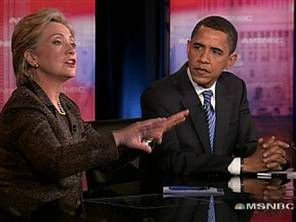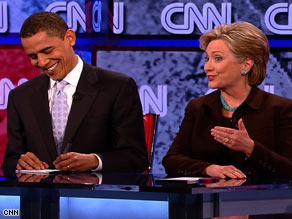Mark the date, the time, the place and the broadcast, especially if you are interested in the political future of our country. On April 16, Senator Barack Obama and Senator Hillary Clinton will meet in Philadelphia at the National Constitution Center. This will be yet another debate in their long-running series. It will run on ABC News for 90 minutes in a two-hour block from 8 p.m.-10 p.m. The extra time is for network news business and spin after the debate ends. Charles Gibson and George Stephanopoulos will moderate. Though I am not a fan of debates -- they are too stilted, too formal, not freewheeling enough -- they do serve an important purpose, usually more for the network producing them than for the candidates participating in them.
Initially when the debates started in late April 2007, during the campaign for president, they were something unique, or if you think about it, maybe not so unique. By that I mean it was a sight to behold to see all those Republicans lined up in a sort of semi-circle for the group shot or family photo as some call it. Here were the men who decided by themselves, usually with no help from their party, that to be president of the United States was just about the best job opportunity found anywhere. All ego with blinkers helps make a candidate blind to reality. These aspirants were all middle-aged and older, successful white males in identical dark suits with similar dark ties. By any set of rules, I never thought there was much to choose between them. But they did. So they were out campaigning day after day, night after night and then had their chance for grandstanding using the bully pulpit of national TV.

© MSNBC
Hillary Clinton and Barack Obama during the Cleveland debate.
Understand, the Democrats do not get a free ride from me, either. The only difference with them was the lone woman and the one black man among all the other interchangeable white males in almost identical suits and ties. This is not new, but someday it will make an interesting doctoral thesis for some aspiring academic.
Today, when the fight for the Democratic nominee is still fluid, it is meaningless to discuss who won each debate. Unless we witnessed a monumental gaff, most of the time the debaters were even. It is, however, relevant for me to take a look at how cosmetics dominated what we saw on the small screen.
As candidates failed and their numbers dwindled to a precious few, the character of the debates changed. The flow of the campaign and how the networks produced each new confrontation also changed. Soon the debates took on the character of a game show. Particularly the most recent. The audiences in the halls grew larger. Partisan clapping and cheering became part of the evening's entertainment. Candidate signs and placards popped up everywhere in each auditorium. I imagined I could hear an announcer shouting, "C'mon down!" I could see anxious housewives and out of work husbands rushing the stage to be first to win a new set of dishes or a flat screen TV. It felt as if we were at a high school pep rally. We were part of the celebration for the homecoming queen or king. I expected to see flashing lights, blazing colors, flags flying, and cheerleaders going through their routines. I found it a supreme loss of dignity for the political process. I covered national politics starting in 1964. I understand campaigning is often crude, crass, mean-spirited and small-minded. Knowing that, I thought at least let the debaters seem as if they are above the noisy fray. The way the networks produced the debates, though, did not give that modest hope a chance.
A word about the debate moderators. In the last debate on CNN, Campbell Brown was the moderator, assisted by John King of CNN and Jorge Ramos of Univision. Though the debate was intended to be freer than those previous, it was apparent CNN lost most of its control early. It did not help that I, and I am sure the audience, had the distraction of a wind beneath the candidates' desk that kept blowing their papers. I wondered when the candidates' notes would fly into the audience. On MSNBC we had Brian Williams trying to control the debaters and not doing a very good job at it. And we had Tim Russert who had his own agenda of playing gotcha, the game he indulges in on "Meet The Press." Watching Williams and Russert, I thought they were not only on a different set – they seemed to be sitting very far apart -- they were in different worlds. Do they not like each other's company? Not for me to say. They were there to do a job, their job, and no one else's. They seemed so far apart physically that if they had good chemistry, you would never have known it.

© CNN
Barack Obama and Hillary Clinton during the California debate.
The flats on the set behind the debaters had nothing to do with politics, but everything to do with who was sponsoring the debate. In the debate co-produced by CNN, I counted as many as 11 CNN logos on the screen, a nasty distraction from the seriousness of the words each candidate uttered. MSNBC, the sponsor of the most recent debate, created a similar atmosphere, as if the debate was about that TV network and not who was running for president. Each time we were in a wide shot, the logo of the network, whether CNN or MSNBC, dominated the screen. That is all I could see. Soon I was counting the logos to see how the number changed in close-ups, in two-shots and wide-shots. With network identifiers dominating my eyes, I sometimes had little time to hear what the participants said. Add the junk each network forced onto the screen, cluttering the bottom line as only they could do in what they consider a service to the audience and we have the real purpose of the debates: self-promotion for the TV network putting on the show. It was as if the news executives were choking the technical duck, the show they were putting on, with every bit of information, whether important or not, to make better paté. The debates we witnessed did not really help us take the measure of the candidates. They were too heavily vehicles for self-promotion by the networks producing them. I don't want to belittle the obvious, but welcome to the 21st century. There is little if any restraint in news on TV. This is 2008. News has become secondary to flash and glitz and there is nothing any of us can do about it.
Rest assured, there will be debates during the campaign for president. The number is unclear. Consider the debates during the run-up as practice sessions for the real thing. Then duck. They will be increasingly tacky because they will be all about the network producing them. Count on it. It is something we can, or maybe not, look forward to during the long slog as we decide who will next occupy the White House. As a consolation prize, maybe the loser will get to spend a night in the Lincoln bedroom. But don't bet on it.
Now, about that debate on April 16. I can only wish that ABC News will be more discreet and discriminating about itself during that debate than other networks have been, but there is no guarantee that will happen. I hope that self-promotion will not dominate the content once again.
Ron Steinman, Executive Editor of The Digital Journalist, is an award-winning producer of television news and documentaries. He was NBC's bureau chief in Saigon during the Vietnam War. He is also an author and freelance documentarian through his company, Douglas/Steinman Productions. Buy Ron Steinman's book: Inside Television's First War.